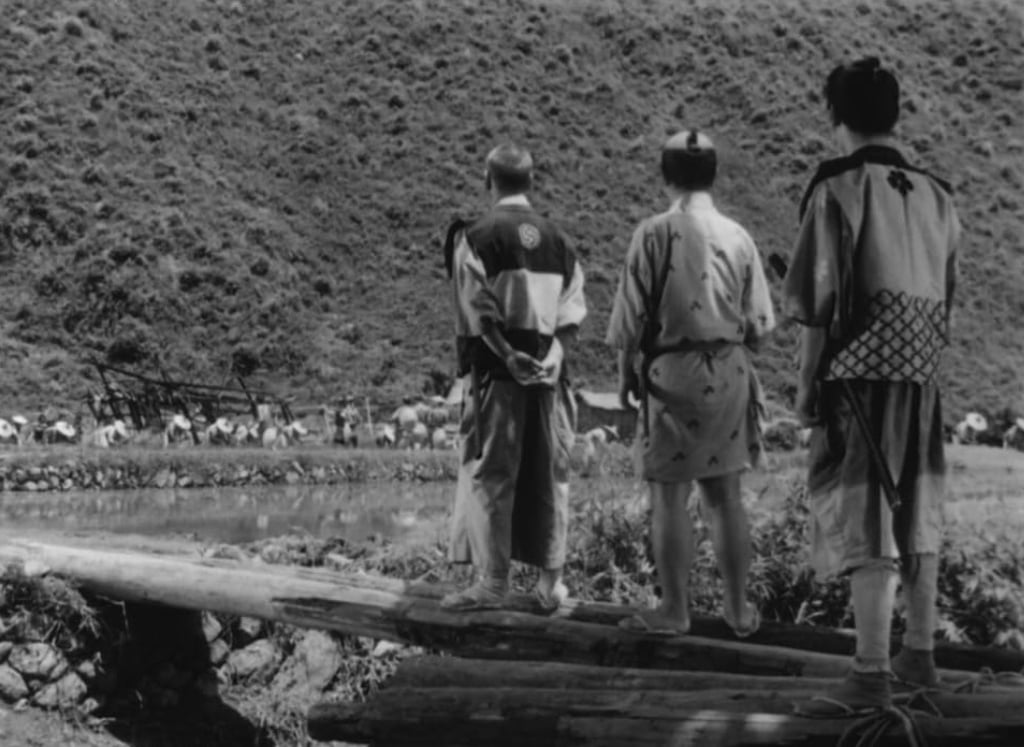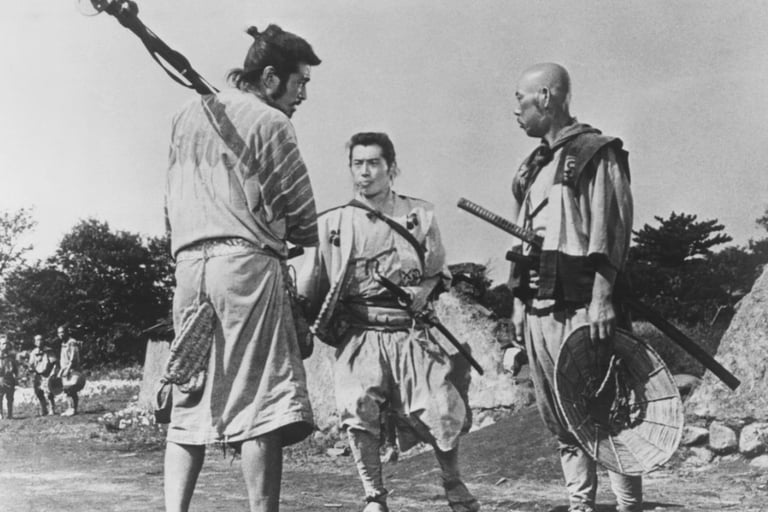The Seven Samurai - film review of one of the most important Japanese films of all time
A timeless masterpiece rediscovered: Seven Samurai (1954) - a film about honour, sacrifice and the transformation of society. Despite its length, Akira Kurosawa's classic film captivates with its masterful staging, dynamic characters and profound philosophical questions. Why is this film still relevant today? A personal film review about suspense, visual brilliance and the question of what true strength means.
Vincent
2/26/20257 min read


I watched the Japanese classic ‘Seven Samurai’ today. One of the most important Japanese films of all time. Why? Because I've caught film fever again in the last few days. I'll be honest, instead of writing blogs with my extra time a day, I've been watching a film a day from the top ranking of imdb, the international film database. I've already ticked off a lot of films there, but some are still on the list. So yesterday I watched ‘The Twelve Jurors’ (1957), which is also a great film, but today I had to watch ‘Seven Samurai’. The film is even a little older than yesterday's film, having been released in 1954, but it's still at number 22 on the top 250 film list. I'll be honest, I've often planned to watch the film, especially because it's actually an absolute must for film-makers. But even I was put off by its age and length (3h30m). Watching a black and white film for three and a half hours? I thought I would never get through it. But as luck would have it, this film is by Akira Kurosawa, one of the most influential film directors in the world. In his 57-year career, he has created 30 films and is of course also the director in Japan. And when I arrived at ‘Seven Samurai’ on the list today, I thought to myself, ‘You have no excuse this time.’
Admittedly, I had some preconceptions before I started the film:
The film would probably drag with its 3h30m and have way too long shots (camera angles)
The film is probably thematically irrelevant for today's world
The film is only interesting for filmmakers
And then I pressed start. And I thought I was right when the credits rolled for several minutes at the very beginning. I used the time to quickly get my dinner in front of the laptop and got ready to be on my mobile phone in between, as I wouldn't miss too much. I started the film in Japanese with English subtitles and then it started. I ate a little and realised relatively quickly that the film wasn't cut as slowly as I had thought. It hardly dragged in the first few minutes, even though I had these preconceptions.
But what is the film actually about?
The film is set in the 16th century, in which a village is attacked by bandits. Out of necessity, they beg a samurai to help them, who assembles six other samurai and prepares the village for the impending next attack before a huge final battle ensues.
At the heart of the story is the question of sacrifice, community and the role of warriors in a world that is beginning to change. It is about honour, duty, class differences and conviction. Respected warriors sacrifice their lives so that peasants can continue to live and work. The samurai represent a dying warrior culture, while the peasants represent the life that can go on after the battle:
The samurai's commitment is necessary, but they themselves barely find a place in this life.
This is why the last quote from the samurai chief and also the last sentence of the film is so impressive:
‘Once again we have survived. The farmers are the winners, not us.’
The film is structured in three stages:
The recruitment of the samurai
The preparation of the village
The final battle
Quite simple, really. But does it work?
And does it work? Because although it is clear relatively quickly that the film will end in a battle, the film plays with it. It could happen at any time, but at the same time it might not. The film moves organically from one scene to the next. The tension remains and is realised by Kurosawa in top class fashion. We are introduced to many characters more and more. Thanks to the actors‘ gestures, the characters’ personalities become clear relatively quickly, and each of the seven samurai also has their own personality, which can be directly grasped from the way each individual walks. However, it must also be said that not every character grows; some live and die without having changed. But you still understand that these people have already gone through growth. Kurosawa is not afraid to show his characters, even if they can be monotonous peasants.
But one of the characters stands out in particular. A former farmer who pretends to be a samurai, the bridge between the farmers and the samurai. He knows both worlds and is the link between them, who mistrust each other. He seems unpredictable and is fun to watch because you never know what he's going to do next. And believe me, he does a lot in the 3.5 hours! He creates conflict, but also incredible depth, because he knows the plight of the farmers. At a turning point, you realise that his silliness is just a facade and that's something about watching him. When facades fall, it touches us humans. Kurosawa has managed this extremely well.
The staging
After a few minutes, it was already clear to me that the film had a lot going for it. Almost every image has vivid compositions. There is always a foreground, middle ground and background that are staged. He has also created movement on each of these levels. Figures move in the foreground, trees in the middle ground, for example, and the weather plays a significant role in the background with wind and rain. Although the cuts initially appear to be used sparingly, Kurosawa compensates for this with the targeted camera movements.
Great care was also taken to ensure that the distribution of roles was clearly visible. Farmers walk crouched in the images, while the samurai usually look down on them from above. They are often in the picture together so that this dynamic can be recognised very quickly.
Fast cuts were used in battle scenes, as in today's films, to increase tension and attention. Real rain scenes were also shot to make the battle scenes even more epic, for example.
As the film has no colours, a lot of light and shadow was used to emphasise the emotions and drama.
I also have to mention how impressed I was with the fight scenes. Thanks to the clever use of shots, you never lose track of the battle, despite the sometimes huge fights. Several cameras must have been running simultaneously during filming so that these fight scenes could be edited organically.
But what philosophical questions does the film address?
The film quickly picks up on the theme of honour and pride, and you soon ask yourself:
Are the samurai only fighting for the peasants because they no longer have a master to serve?
Is honour linked to status or wealth, or to principles?
And above all, is honour a social construct or an inner compass?
Even today, many people ask themselves the question: should I fight for pride (money and fame) or for a conviction, even if it means losing everything?
And what is true strength?
The samurai were strong, but they also died in battle. What is the point of being strong? You still die in the end.
Or is true strength perhaps something else, such as fighting for something that doesn't benefit you?
Here too, the film picks up on a contemporary theme: In this day and age, selfish strength is often glorified. Be it in politics, business or on social media. And that's where the film cuts in: Is true strength really that? Or is it true strength to be there for others?
Is society fair?
In the film, the samurai distrust the farmers, and vice versa. But they both need each other for food and protection. In the end, however, only the farmers remain and the age of the samurai comes to an end. Is that fair? They would have been lost without the samurai, but living together was still very difficult.
Who is really needed in society and who is exploited?
This topic is also highly topical: in modern societies like Germany, there are workers who are there to provide basic services (carers, teachers, farmers, craftsmen). Nevertheless, like the farmers in the film, they receive little recognition, in contrast to other people who are at the top and are hardly vital for the common good. The film shows a world in which those who fight are not the ones who win.
Can a person change their destiny?
This is a question that really touches me when I write. One of the protagonists, Kikuchiyo by name, was one of the seven samurai, but he was actually just an impostor. He pretends to be a samurai throughout the film and is only ridiculed by the other samurai. It becomes clear over the course of the film that he comes from the peasant class and no matter how hard he tries to be as heroic as the samurai, he is and remains a dolt. Even after a risky action with the risk of losing his own life, he is not celebrated as a hero. But Kikuchiyo does not give up and fights on eagerly, ready to die for his lifelong dream of being a samurai. In the end, he kills the last living bandit and dies a few seconds later from his bullet wound next to the samurai flag. In the end, he has changed his destiny, from farmer to samurai, even if it cost him his life.
Can you really escape your fate and mould it yourself?
Can you really achieve anything from a poor background today? Or are there still invisible boundaries, as in ‘Seven Samurai’? Opinions are probably divided on this.
And this question is also posed in the film: Is violence a necessary evil or an eternal cycle?
The samurai fight and kill to protect the village, but is this the only solution? The village can only be saved by violence, but in the end there is a bitter aftertaste: there is no celebration, only graves.
Does violence ever lead to a final solution or does violence only light a long fuse for more violence?
In times of war, this is also a relevant question. Is violence a solution? For the bandits? For the village protectors? What is left for us in the end? Certainly not a celebration either. Hopefully not too many fuses will be lit.
Conclusion
Seven Samurai is a film about a bygone era, and at the same time it is not. It is a reflection on how societies function. Themes such as honour, pride, injustice, violence and change are just as important today as they were then. But this masterful film shows one thing even without any unanswered questions:
True heroes expect no rewards. They help selflessly because they see that help is needed.


